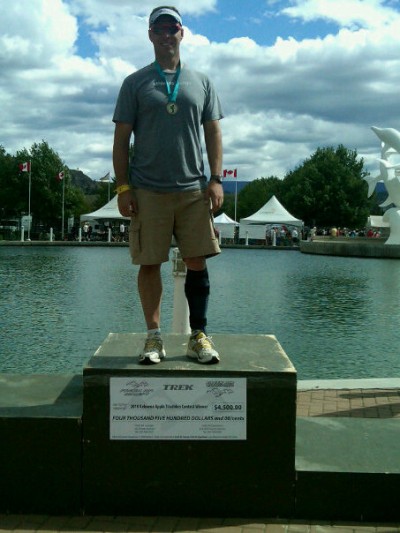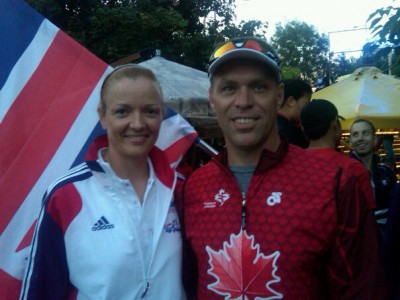I asked Darren Smith to share his story about paratriathlon, and classification.
Darren is a paratriathlete and has competed at the International Triathlon Union Paratriathlon World Championships in Vancouver as well as Budapest. I met Darren on Twitter and we have exchanged messages about our lives as challenged athletes for almost 2 years now.

Darren has an amazing story. He has done what I aspire to – and has also experienced the frustrations I have with regard to paratriathlon and its system of classification. I will let you read his story… You can also read more Darren, his races, training and experiences on his site.
Darren’s Story
I don’t use a wheel chair or crutches but I’m a challenged athlete. All my limbs are intact, but I’m a challenged athlete. I have completed Ironman Florida and Ironman Canada as a challenged athlete. I used to be a hockey player, a football player, and a mountain biker, then I became an AWAD, (AKA athlete with a disability/physically challenged/handicapped), and then I morphed into a paratriathlete.
In 2002, I had a surgical procedure which unfortunately resulted in paralysis of my left leg. I was told I would be lucky to walk again let alone do another triathlon. I thought I would be in a chair for the rest of my life and having a need to do sport I began searching for things I could do. Through a web search while still in the hospital, I found the Challenged Athletes Foundation (CAF) and after proving the doctors wrong by regaining some of my motor function, I learned to walk again without crutches, and began training for my first half iron distance triathlon, the San Diego Triathlon Challenge. It took me 8 hours and 20 minutes, but I did it, 2 years less a day after my injury. In 2005, I took almost an hour off that time, and the following year, I became an Ironman in Florida.
During most races, I use an ankle brace or an AFO (ankle foot orthosis). When people pass me on the run, I’m usually limping or have an altered gait and they always ask how my ankle/knee is but they wouldn’t think for a minute that I am physically challenged, only that I have an injured part.
For years I competed as a part of “The Others” or “Les Autre” TRI3 paratriathlon classification. Some of us have spinal cord injuries, others have cerebral palsy, Multiple Sclerosis , or “other physical deficits, not otherwise described”. Being part of “the others” is sometimes difficult. It’s as if we aren’t really disabled.
Thanks to CAF, I was able to compete in the 2008 ITU World Championships, coming in 5th in the TRI3 classification. I got to stand on top step of a podium for the first time in my life in 2008, when I won my division at Canadian Nationals, coming in 3rd overall. In 2009, I was named the XTERRA Northwest Regional Champion for the paratriathlete division.
In Budapest, I was classified as a TRI5 athlete, which is also known as “moderate leg impairment”. In a recent email from Triathlon Canada showing the Budapest results, it said my classification was “leg impairment below the knee”. Regardless of how you word it, it is made up primarily of the Below Knee amputee (BK) athletes. I believe I was the only non-BK in the group.
I protested the category I was placed in at the World Championships in Hungary. I am a physician and I do muscle testing and other neurological testing in my practise.
Something has to be changed with respect to the classification system with paratriathlon as a Paralympic sport. We have three sports and the examiners need to be adequately trained in classification for cycling, athletics, and swimming. If nothing else, a technical component needs to be added to the process as there is in most para-sports. Even though I am not as familiar with the paratriathlon classification procedures as the classifiers, I am more than qualified to make a protest based on what I feel was a poor neuromuscular exam, as I perform them on a regular basis.
Here are some the reasons why I protested:
1. All of the muscle testing was done either seated, side lying, or supine. Not one muscle test was done prone or standing. Had any of the testing been done prone or in a weight bearing position, ie. One legged squat, single leg calf raise, I believe this would have shown the weakness in a manner that may demonstrate my lack of ability, particularly when it comes to the running portion of triathlon.
2. Manual Muscle testing has multiple variable. Given my size (105kg) and the fact that the classifier was perhaps only half of my size, the classifier would not have been able to reproduce the force that my legs would endure during the run. My tests, in my opinion, did not meet the criteria needed to effectively test my muscles.
3. A Full Range of Movement test was not conducted.
4. I have a moderate amount of involuntary muscle contraction (clonus) which affects my cycling and to a slight degree, my running. I mentioned this to the examiner and she said it was not part of their testing but I do not recall hearing the reasoning. It is a part of paracycling testing.
5. I was told I would be watched during the race and my classification re-evaluated during the event. I did not see or hear from the classifiers again. A techincal evaluation is part of paracycling classification and it seems that is should be part of paratriathlon classification as well given that most of us are not only on our bikes but also on our feet.
6. My times are closer to the TRI2 (above the knee impaired athlete) times than the TRI5 (BK impaired athletes) so if I am going to be put in with amputee athletes, it stands to reason that due to my hip muscle weakness, I would be with the Above the Knee (AK) athletes versus the BK. I realize that the category is not amputee specific but with the weakness and subsequent lack of coordination of my entire left leg, not just my lower leg, the proper category would be TRI2 (AK). Having said that, I have weakness in both legs, more severe in the left than the right, and according to the ITU website under categories, the more appropriate category would be TRI3 (Les Autres, as I was classified in 2008).
7. While I understand that my knowledge of the paratriathlon classification system is not as broad as that of the classifiers, I do understand the type of testing that was performed on me and I think it was insufficient to demonstrate the level of my weakness. I’m not an obvious amputee or para/quadriplegic so I know there is a level of subjectivity with respect to my classification. I feel if some additional testing were performed, as I had asked at the time of my classification, I may have been put into a different category.
I was a TRI3/les autre in Vancouver and placed 5th. I would have placed 6th in Budapest as a TRI3. My classification, if changed, will not unseat any medal winners, but for future competition, it will make a huge difference.
Donna’s thoughts
The appropriate classification makes a huge difference for an athlete. It helps to set goals, training plans, and ultimately will determine participation in World Championships and The Paralympics, as numbers of athletes will be limited. For this reason, protests need to be taken seriously, as does the system of classification.
Darren filed an official protest with the ITU following his reclassification in Budapest from the TRI3 (Les Autres) category to the TRI5 (BK) category. A good portion of his protest is what I have extracted above.
Darren’s protest letter was forwarded to the same person that did his paratriathlon classification in Budapest. How strange that for a decision protest, the same individual who did the classification assessed the merits of the protest. Darren received this reply within 24 hours of his letter, stating that his classification would remain the same.
The response to Darren was straight forward and primarily referenced the Paratriathlon Classification Procedures, but did not address the points that Darren raised (summarised above).
To quote from the letter:
“It has been determined that all appropriate classification procedures have been followed to allocate your classification and status and I wish to inform you that your Paratriathlon protest has been dismissed.”
The merits of the protest appear to have not been considered in the communication to Darren – only whether or not the appropriate classification procedures were followed. Although the response goes on to say that with the testing used, Darren had sufficient muscle testing to meet the profiles for a BK TRI5 classification but not the TRI3 Les Autres or TRI2 AK classification, the letter does not explain why viewing in competition was not used to verify the change in classification, nor are the issues Darren raises with regard to the appropriateness of the muscle testing addressed. Finally, it seems very odd that the protest was handled by the same individual who undertook the classification, leading one to question the fairness of the process of the protest process.
I think Darren sums up the very well – in the Les Autres category athletes can be left feeling as if they aren’t disabled. In my view, this can easily morph into a feeling of not being understood as easily as more visible disabilities, therefore not seemingly belonging to the movement. Sadly the protest and classification experience he has had can only reinforce this feeling in my opinion.

Darren pictured with Melanie Ryding, of Team Great Britain, at the Triathlon Budapest World Championships 2010
